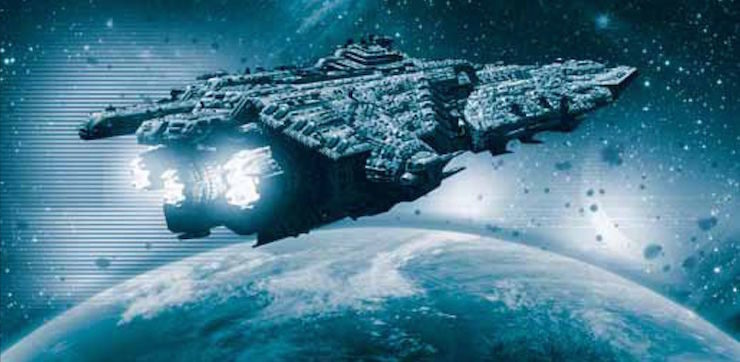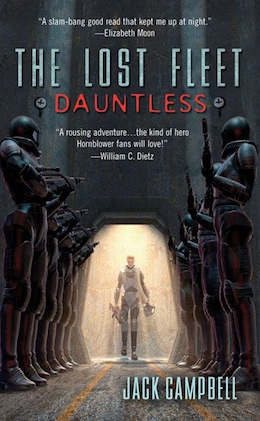In this bi-weekly series reviewing classic science fiction and fantasy books, Alan Brown looks at the front lines and frontiers of the field; books about soldiers and spacers, scientists and engineers, explorers and adventurers. Stories full of what Shakespeare used to refer to as “alarums and excursions”: battles, chases, clashes, and the stuff of excitement.
There is nothing more exciting than a good naval story: thrilling chases and escapes, the chess game of maneuver as forces close in on each other, and the fierce excitement of a pitched battle. Add to that tactical element the fate of nations and empires hanging in the balance, and you have all the ingredients of high adventure. It is no wonder that science fiction authors have used naval adventures as a template for space opera, and one of the most successful of these adventures has been the Lost Fleet series by Jack Campbell.
First, though, some background: the Borders Bookstore chain was one of my favorite places, and I (along with many other readers) mourned when it closed in 2010. But the closing also created some short-term opportunities for book buyers, with sales and discounts becoming more and more aggressive as the final closure came near. At that time, I was burned out on military science fiction. There was too much of it that was pedantic, brimming with heavy-handed politics, and bogged down with too much exposition about weapon systems and such. Thus, even though it looked promising, I had ignored the Lost Fleet series when it first appeared. Eventually, though, with the ever-deepening discounts at Borders, I had the opportunity to buy the first five or so books of the series for not much more than $10. So I gave the Lost Fleet series a chance, and was immediately glad that I did, because I was immediately swept away by the story. Having so many of the books in front of me, I was able to jump into the series without that long and awkward wait between volumes. I also found that Jack Campbell was actually the pen name for John G. Hemry, an author whose work I had been enjoying in Analog.
About the Author

Jack Campbell is the pen name of John G. Hemry (born 1956), a retired Navy officer who graduated from Annapolis in 1978. He served as a “black shoe,” or surface line officer, a background which shows in the capital ship orientation of his tales of naval actions in space. While he is best known for the Lost Fleet books, he has written a number of other novels and has had short fiction published in outlets such as Analog.
The Lost Fleet series follows the adventures of Captain John “Black Jack” Geary, awakened after a century of suspended animation in an escape pod. He finds himself deep in enemy territory, in command of a defeated fleet that must find its way home through many star systems. Hemry has been quoted as saying the series was inspired by Xenophon’s Anabasis, the story of an army of Greek mercenaries who fought their way home over many miles and past many opponents. (Forlorn Hope by David Drake, which I reviewed here, was also reportedly inspired by that tale.)
The Lost Fleet series grew to six books, and led to two spin-off series. The first series, The Lost Fleet: Beyond the Frontier, was a direct sequel following the further adventures of “Black Jack” Geary. These novels expand the scope somewhat, featuring some quite interesting alien races and introducing other challenges, not to mention a somewhat satirical visit to the old backwater known as Earth. The second series, The Lost Stars, follows the efforts of Syndicate worlds to deal with the other side of the conflict with the Alliance.
The World of the Lost Fleet

Campbell does an impressive job of establishing the background, tactics, and limits of the forces, their ships, and their weaponry. He also does so with a minimum of fuss, which prevents the story from bogging down with minutia and background.
The story centers on two interstellar empires locked in conflict: the democratic Alliance, with a Navy organized on the British/American model, versus the Syndicate, whose society and military seems to be rooted more in commercial organizations, using titles like “CEO” for ship commanders and planetary leaders. The Alliance is in a coalition with the Callas Republic and Rift Federation. Their war has been going on for about a century; during that time, both sides have become hardened and cynical. The Alliance has become obsessed with the individual initiative of commanders, and has taken Nelson’s old dictate that, “no captain can do very wrong if he places his ship alongside that of the enemy,” to an extreme. Organized fleet actions and even acceptance of orders from a commodore are a thing of the past. Atrocities—including the destruction of entire planets and civilian populations, and the killing of prisoners—have become routine.
The people of the Alliance generally practice a form of ancestor worship. Their military is fully integrated, with men and women serving in all capacities in the Fleet and Marines. Relationships between seniors and subordinates while on active duty are frowned upon. Concerns or issues based in the divisions between the various nationalities and races of the Earth appear lost to history.
Warfare is waged with capital ships, with the closest analog from history being the sea battles of World War I. The heaviest units are battleships, although these are also slower than the other combat units. The backbone of the fleet are the battle cruisers, heavily armed but also quite fast. Other combatants include heavy cruisers, light cruisers, and destroyers. There are no analogs for modern fighter jets; combat is conducted entirely by larger units. Assault transports carry Fleet Marine units, and auxiliaries provide a broad range of support. Those auxiliaries can fabricate any needed materials and parts from their component elements, and even produce the “fuel cells” that provide power for propulsion. Thanks to the abilities of these auxiliaries, the fleet can operate quite far away from bases, although the auxiliaries are slow and protecting them is a constant concern. The Syndics have similar capabilities, although they also use ship types such as hunter-killers and corvettes.
Ships can move within star systems at a significant fraction of lightspeed, although targeting becomes problematic when closing speeds exceed about two tenths of lightspeed. Travel between systems occurs via jump points and a system jump drive, although there is an even more effective hypernet gate system that requires keys to access it. There are no faster than light communications or sensors, so communication lags are a major concern in terms of both detecting the enemy and coordinating forces that may be scattered across many light minutes or even hours.
Weaponry consists of charged particle “hell lances,” projectiles called “grapeshot” that move at relativistic speeds, “specter” guided missiles, and a short range “null field” that can disintegrate an enemy. Ships have shields that can mitigate the impact of attacks as well as active defenses against missiles. There are also mines that can be deployed near jump points.
Combat in the novels is presented in a straightforward manner, with enough detail to help you visualize what is going on, but not enough to bog down the proceedings.
The Lost Fleet: Dauntless

The book opens from the viewpoint of a very disoriented John Geary. He finds that not only has he been in suspended animation in a damaged escape pod for about a century, in the interim he has been posthumously advanced to the rank of Captain, and his last battle has become the inspiration for a mythical character called “Black Jack,” whose legendary example has inspired the fleet for generations. The fleet that has picked him up has just suffered a grievous defeat at the hands of the Syndics. Admiral Bloch takes his senior officers over to negotiate with the victors, and leaves the fleet in the hands of Captain Geary, whose date of rank as Captain exceeds that of any other Captain in the fleet by decades. (Having seen how some officers obsess over date of rank, I got a kick out of that little touch.)
When the Admiral and his retinue are assassinated, Geary finds himself faced with a surrender demand. He has a holo-conference with his captains, which feels more like a mutinous assembly than a planning meeting, and decides that the fleet must try to fight their way out of the situation. The fact that Geary has been out of circulation for a century provides a good excuse for the “As you know, Bob” conversations that are used as a vehicle for so much exposition in science fiction stories. (Interestingly, Hemry published a story titled “As You Know, Bob” in Analog in 2007.) He gets an update on weapons and tactics from Captain Desjani, a dashing young female officer who serves as CO of his flagship, the Dauntless. He also gets political advice from Victoria Rionne, Co-President of the Callas Republic, who was left behind when the Admiral went to negotiate.
Geary develops a battle formation and insists on all ships following it, although many follow it loosely at best. He has decided not to use the hypernet, but instead uses jump points to go even deeper into Syndic territory, to a system with the advantage of further jump points to three additional systems. If they can get supplies in that system, and keep the Syndics guessing as to where they will go next, they can survive to fight another day. On the way to the jump point, one of their critical auxiliaries is unable to keep up, and one of Geary’s descendants sacrifices himself and his ship to hold off the enemy and allow their escape.
In the new system, they find only light defenses, and are able to resupply as well as practice the tactics and techniques that have atrophied in the decades while Geary slept. He works to gain control over the restive officers who command the ships of his fleet, and insists on obedience to direction. He learns which officers he can trust, and which he must relieve or retrain. Slowly, through drills and then through battle, the fleet begins to accept his leadership and begins the long journey home.
The fact that he is the mythical “Black Jack” helps to establish his authority, but the legend also proves to be a difficult burden to carry. Ironically, the qualities ascribed to the mythical “Black Jack” are not the ones that the real Captain Geary brings to the fight. Rather than aggressiveness and impulse, he leans toward thoughtfulness, fidelity to duty, and compassion. He may not be the figure of myth, but it becomes more and more obvious that he is exactly the leader the Alliance fleet requires in their hour of need.
Final Thoughts
The Lost Fleet series moves at a galloping pace. Every time an obstacle is overcome, a new one arrives to take its place. Captain Geary is a personification of military virtues, but Campbell does a good job of making him feel like a real and sympathetic person, as he grapples with his doubts, and with his feelings of loss for the world he left behind. There are political themes here, but they are not heavy-handed, and the story does not get lost in lengthy meditations on history or weapon systems. The re-reading showed me that Campbell was playing the long game, as there are many elements seeded throughout the novel that pave the way for events many books in the future. The most notable thing about The Lost Fleet: Dauntless is the way it presents very large fleet actions in a way that is clear and easy to follow—if you like military science fiction, and especially fiction that deals with space navies, this book will be right down your alley.
And now it’s time for your comments. Have you read the Lost Fleet series, or any of the related series? If so, what did you think? Did you enjoy it for the same reasons I did?
Alan Brown has been a science fiction fan for over five decades, especially fiction that deals with science, military matters, exploration and adventure.










